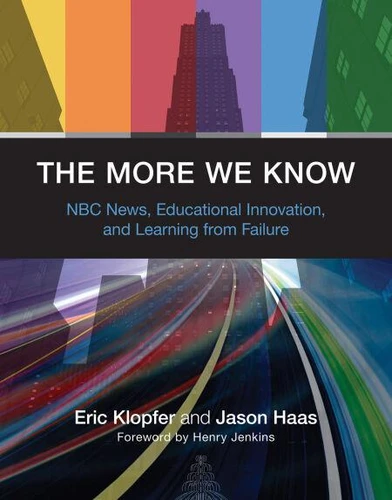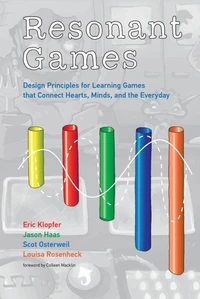The More We Know. NBC News, Educational Innovation, and Learning from Failure
Par : , ,Formats :
Disponible dans votre compte client Decitre ou Furet du Nord dès validation de votre commande. Le format ePub protégé est :
- Compatible avec une lecture sur My Vivlio (smartphone, tablette, ordinateur)
- Compatible avec une lecture sur liseuses Vivlio
- Pour les liseuses autres que Vivlio, vous devez utiliser le logiciel Adobe Digital Edition. Non compatible avec la lecture sur les liseuses Kindle, Remarkable et Sony
- Non compatible avec un achat hors France métropolitaine
 , qui est-ce ?
, qui est-ce ?Notre partenaire de plateforme de lecture numérique où vous retrouverez l'ensemble de vos ebooks gratuitement
Pour en savoir plus sur nos ebooks, consultez notre aide en ligne ici
- Nombre de pages232
- FormatePub
- ISBN978-0-262-30469-6
- EAN9780262304696
- Date de parution21/09/2012
- Protection num.Adobe DRM
- Taille7 Mo
- Infos supplémentairesepub
- ÉditeurThe MIT Press
Résumé
The rise and fall of iCue: lessons about new media, old media, and education from an NBC-MIT joint venture into interactive learning. In 2006, young people were flocking to MySpace, discovering the joys of watching videos of cute animals on YouTube, and playing online games. Not many of them were watching network news on television; they got most of their information online. So when NBC and MIT launched iCue, an interactive learning venture that combined social networking, online video, and gaming in one multimedia educational site, it was perfectly in tune with the times.
iCue was a surefire way for NBC to reach younger viewers and for MIT to test innovative educational methods in the real world. But iCue was a failure: it never developed an audience and was canceled as if it were a sitcom with bad ratings. In The More We Know, Eric Klopfer and Jason Haas, both part of the MIT development team, describe the rise and fall of iCue and what it can teach us about new media, old media, education, and the challenges of innovating in educational media.
Klopfer and Haas show that iCue was hampered by, among other things, an educational establishment focused on "teaching to the test, " television producers uncomfortable with participatory media, and confusion about the market. But this is not just a cautionary tale; sometimes more can be learned from an interesting failure than a string of successes. Today's educational technology visionaries (iPads for everyone!) might keep this lesson in mind.
iCue was a surefire way for NBC to reach younger viewers and for MIT to test innovative educational methods in the real world. But iCue was a failure: it never developed an audience and was canceled as if it were a sitcom with bad ratings. In The More We Know, Eric Klopfer and Jason Haas, both part of the MIT development team, describe the rise and fall of iCue and what it can teach us about new media, old media, education, and the challenges of innovating in educational media.
Klopfer and Haas show that iCue was hampered by, among other things, an educational establishment focused on "teaching to the test, " television producers uncomfortable with participatory media, and confusion about the market. But this is not just a cautionary tale; sometimes more can be learned from an interesting failure than a string of successes. Today's educational technology visionaries (iPads for everyone!) might keep this lesson in mind.
The rise and fall of iCue: lessons about new media, old media, and education from an NBC-MIT joint venture into interactive learning. In 2006, young people were flocking to MySpace, discovering the joys of watching videos of cute animals on YouTube, and playing online games. Not many of them were watching network news on television; they got most of their information online. So when NBC and MIT launched iCue, an interactive learning venture that combined social networking, online video, and gaming in one multimedia educational site, it was perfectly in tune with the times.
iCue was a surefire way for NBC to reach younger viewers and for MIT to test innovative educational methods in the real world. But iCue was a failure: it never developed an audience and was canceled as if it were a sitcom with bad ratings. In The More We Know, Eric Klopfer and Jason Haas, both part of the MIT development team, describe the rise and fall of iCue and what it can teach us about new media, old media, education, and the challenges of innovating in educational media.
Klopfer and Haas show that iCue was hampered by, among other things, an educational establishment focused on "teaching to the test, " television producers uncomfortable with participatory media, and confusion about the market. But this is not just a cautionary tale; sometimes more can be learned from an interesting failure than a string of successes. Today's educational technology visionaries (iPads for everyone!) might keep this lesson in mind.
iCue was a surefire way for NBC to reach younger viewers and for MIT to test innovative educational methods in the real world. But iCue was a failure: it never developed an audience and was canceled as if it were a sitcom with bad ratings. In The More We Know, Eric Klopfer and Jason Haas, both part of the MIT development team, describe the rise and fall of iCue and what it can teach us about new media, old media, education, and the challenges of innovating in educational media.
Klopfer and Haas show that iCue was hampered by, among other things, an educational establishment focused on "teaching to the test, " television producers uncomfortable with participatory media, and confusion about the market. But this is not just a cautionary tale; sometimes more can be learned from an interesting failure than a string of successes. Today's educational technology visionaries (iPads for everyone!) might keep this lesson in mind.




